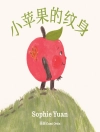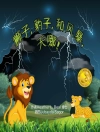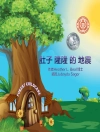Kari the Elephant (1922) is a children’s book by Dhan Gopal Mukerji. Published the year Mukerji moved from San Francisco to New York City, Kari the Elephant is the debut children’s book from the first Indian writer to gain a popular audience in the United States. Although less popular than his novel Gay Neck: The Story of a Pigeon (1927), which won the 1928 Newbery Medal, Kari the Elephant is a beautiful tale of kinship between the human and animal worlds set in the lush forests of the author’s native India. “Kari, the elephant, was five months old when he was given to me to take care of. I was nine years old and I could reach his back if I stood on tiptoe. He seemed to remain that high for nearly two years. Perhaps we grew together; that is probably why I never found out just how tall he was.” Raised side by side, Kari and his handler grow inseparable through their travels in the Indian countryside. As their adventures bring them to cities, jungles, and distant lands, boy and elephant overcome danger and learn the true meaning of friendship. Although he never returned to his native country, Mukerji left an inspiring legacy through his literary achievement and unwavering commitment to Indian independence. This edition of Dhan Gopal Mukerji’s Kari the Elephant is a classic of Indian American literature reimagined for modern readers.
Since our inception in 2020, Mint Editions has kept sustainability and innovation at the forefront of our mission. Each and every Mint Edition title gets a fresh, professionally typeset manuscript and a dazzling new cover, all while maintaining the integrity of the original book.
With thousands of titles in our collection, we aim to spotlight diverse public domain works to help them find modern audiences. Mint Editions celebrates a breadth of literary works, curated from both canonical and overlooked classics from writers around the globe.
A propos de l’auteur
Dhan Gopal Mukerji (1890-1936) was an Indian American writer. Born near Calcutta, Mukerji was the son of a former lawyer who devoted himself to music and prayer. A member of the Brahmin caste, Mukerji spent a year living an ascetic lifestyle before enrolling at the University of Calcutta, where he joined a group of Bengali revolutionaries with his older brother Jadugopal. In 1910, Mukerji was sent to Japan to study industrial engineering, which he soon abandoned to emigrate to the United States. Settling in San Francisco, he joined the local bohemian community of anarchists and artists while studying at the University of California at Berkeley and later Stanford. In his time in California, he published two books of poems—Sandhya, or Songs of Twilight (1917) and Rajani, or Songs of the Night (1922)—and a musical play, Laila Majnu (1922). Mukerji graduated in 1914 with a degree in English, married artist Ethel Ray Dugan in 1918, and moved to New York City in the early 1920s. There, he embarked on a career as a popular children’s book author, finding success with Kari the Elephant (1922) and Gay Neck, The Story of a Pigeon (1927), winning the 1928 Newbery Medal from the American Library Association for the latter. Recognized as the first popular writer of Indian origin in the United States, Mukerji struggled with marginalization and racism and regretted his exile from India late in life. Unable to return because of his youthful commitment to revolutionary politics, he supported the Indian independence movement with money and advocacy from abroad. Ultimately, he ended his life alone in his apartment in New York City.












